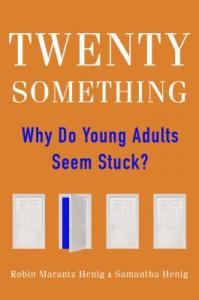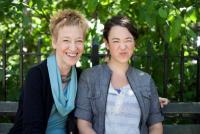December 2012: Twentysomething/Henig & Henig
TWENTYSOMETHING: WHY DO YOUNG ADULTS SEEM STUCK?
Robin Marantz Henig (NASW member) and Samantha Henig
Hudson Street Press, November 2012, $25.95
ISBN-10: 1594630968
Contact info:
- Robin Marantz Henig, 212.932.8319, robinhenig@nasw.org, @robinhenig
- Samantha Henig, 347.429.0692, samantha.henig@gmail.com, @scootes
- Publicist: Courtney Nobile, 212.366.2230, courtney.nobile@us.penguingroup.com
- Agent: David Black, 718.852.5500, dblack@dblackliteraryagency.com
- Author website: http://www.robinhenig.com
- Blog website: http://www.psychologytoday.com/blog/cusp
Robin Henig writes:
Last year I wrote a book with my daughter Samantha, then 27, who is also a journalist. (When we began she was an editor for the New Yorker web site; midway through she took an even more demanding job, as the web editor of The New York Times Magazine.)
The book, called TWENTYSOMETHING, began as an article I wrote for The New York Times Magazine in August 2010 that looked at whether "emerging adulthood" is a new developmental stage, which some psychologists say occurs between about ages 18 and 29. After the article went viral on Facebook, Twitter, and elsewhere, some publishers approached me to see if I wanted to expand it into a book. Only with my daughter, I told them.
I was interested in writing TWENTYSOMETHING so I could explore some of the issues I hadn't had space for in the article — the decisions young people make about schooling, careers, marriage, and children, and to what extent the experience of one's twenties is the same today as it's always been. But what really interested me, I must confess, was the chance to work with Samantha, one of my favorite people on earth who is objectively — ask anyone! — a delightful person to spend time with.
After Samantha and I agreed on a rough idea of an organization, I would write a draft of a chapter and send it to her for edits. She'd punch it up — I thought of it as youthifying — and she'd also put in her inserts in her own voice. Sometimes I'd suggest places for her inserts, sometimes she'd decide there was a spot where she had something she wanted to say. Then she'd send back her edits and her inserts, and I'd edit that draft, and send it back to her, and so on and so on.
What we ended up with is a book written for twentysomethings as well as the parents who love them and worry about them. We explore the issues surrounding twentysomethings' needs to close doors and make commitments during this stage of life. And we ask how much about being young today is unique. Some things have changed, of course — constant connection speeds up everything, and keeps parents and their adult children in more frequent contact, and the high cost of schooling colors many career decisions — but we were surprised by how many concerns about "kids today" were expressed, almost verbatim, back when the Baby Boomers were young.
———————————
Deadline for January 2013 book column: Dec. 29, 2012
To submit your book announcement, follow the above format. Include your name, phone number, and email address, along with contact information for your publicist and agent.
Write 250-350 words to summarize your book’s contents. Tell how you developed your idea, researched the book, and wrote it. Include a little about the book’s route to publication. No press releases, please.
Send info to Lynne Lamberg, editor, New books by NASW Members, llamberg@nasw.org.





